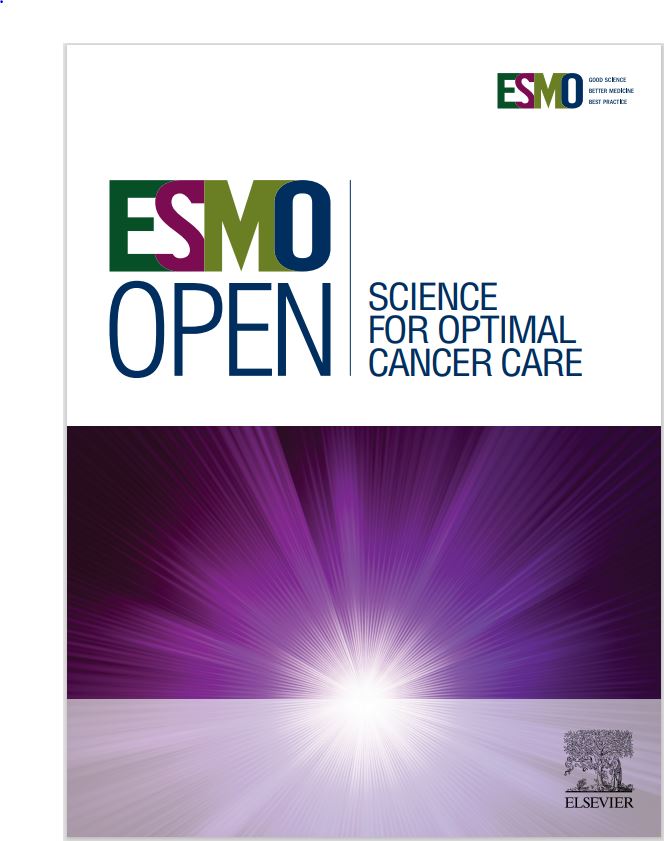Atezolizumab plus bevacizumab as first-line treatment of unresectable hepatocellular carcinoma: interim analysis results from the phase IIIb AMETHISTA trial
IF 7.1
2区 医学
Q1 ONCOLOGY
引用次数: 0
Abstract
Background
The treatment of advanced hepatocellular carcinoma (HCC) with atezolizumab and bevacizumab led to significant improvements in overall survival (OS), progression-free survival (PFS), and response rate compared with sorafenib in the phase III IMbrave150 trial. The etiology of background liver disease can differ between Eastern and Western populations, leading to a potentially different impact of systemic therapies; therefore the unequal representation must be considered in the IMbrave150 trial. To provide further data on the safety and effectiveness of atezolizumab and bevacizumab, the phase IIIb AMETHISTA (Atezolizumab plus bevacizumab in METastatic HCC Italian Safety TriAl) ran in a Western (Italian) population of patients with advanced HCC. The results of the interim analysis are presented in this paper.
Methods
AMETHISTA is a multicenter, phase IIIb, single-arm study evaluating the safety and effectiveness of atezolizumab and bevacizumab in an Italian population of patients with systemic treatment-naive HCC (ClinicalTrials.gov: NCT04487067). The primary objective was safety (incidence of grade 3-5 bleeding/hemorrhages). The main secondary objective was effectiveness.
Results
A total of 152 patients were enrolled and 149 were treated. At the cut-off date, the median observation time was 13.4 months (interquartile range 8.3-15.5 months). The incidence of grade 3-5 bleeding/hemorrhages was 11.4%. Besides, results of other safety endpoints were consistent with the safety profile of atezolizumab plus bevacizumab, and the underlying disease, without any new safety observation. The median OS was 18.2 months (95% confidence interval 15.4 months to not evaluable); the median PFS was 8.5 months (95% confidence interval 7.5-11.2 months).
Conclusion
Results from the interim analysis are consistent with data from the IMbrave150 trial, and further confirm first-line atezolizumab plus bevacizumab as a standard of care for patients with systemic treatment-naive advanced and unresectable HCC.
求助全文
约1分钟内获得全文
求助全文
来源期刊

ESMO Open
Medicine-Oncology
CiteScore
11.70
自引率
2.70%
发文量
255
审稿时长
10 weeks
期刊介绍:
ESMO Open is the online-only, open access journal of the European Society for Medical Oncology (ESMO). It is a peer-reviewed publication dedicated to sharing high-quality medical research and educational materials from various fields of oncology. The journal specifically focuses on showcasing innovative clinical and translational cancer research.
ESMO Open aims to publish a wide range of research articles covering all aspects of oncology, including experimental studies, translational research, diagnostic advancements, and therapeutic approaches. The content of the journal includes original research articles, insightful reviews, thought-provoking editorials, and correspondence. Moreover, the journal warmly welcomes the submission of phase I trials and meta-analyses. It also showcases reviews from significant ESMO conferences and meetings, as well as publishes important position statements on behalf of ESMO.
Overall, ESMO Open offers a platform for scientists, clinicians, and researchers in the field of oncology to share their valuable insights and contribute to advancing the understanding and treatment of cancer. The journal serves as a source of up-to-date information and fosters collaboration within the oncology community.
 求助内容:
求助内容: 应助结果提醒方式:
应助结果提醒方式:


